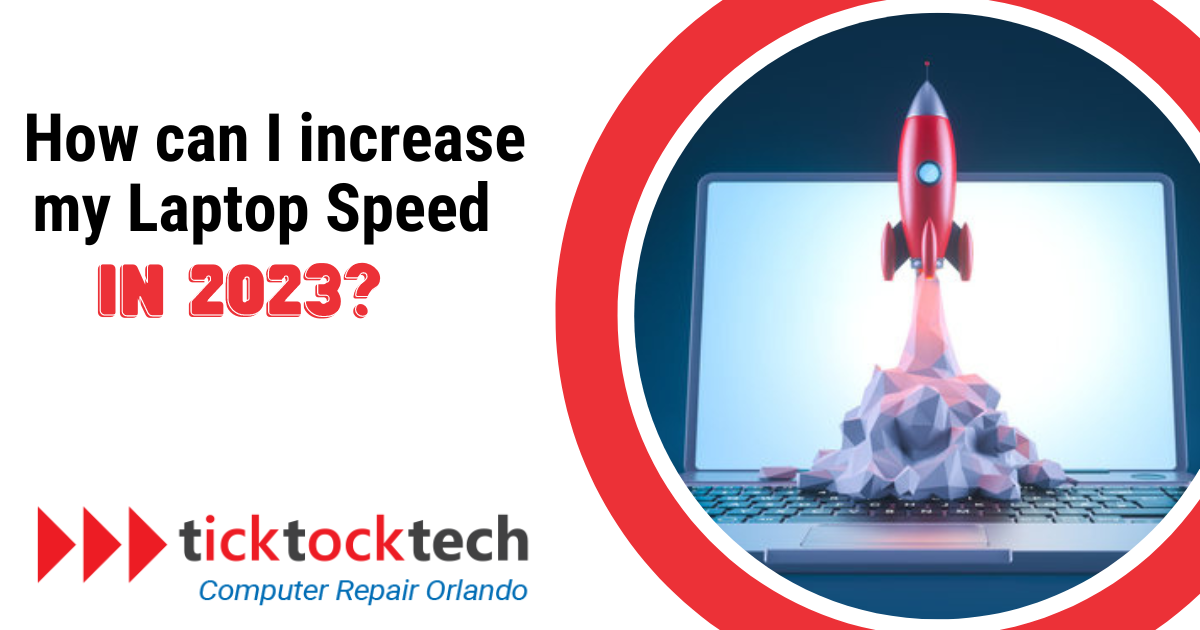When selecting a laptop, its speed is a crucial factor to consider. However, laptop speed can diminish over time due to various factors, including software updates, hardware wear and tear, and the accumulation of temporary files and unnecessary data.
If you notice that your laptop is performing more slowly than before, there are several measures you can take to enhance its speed. Some of these remedies involve software adjustments and can be swiftly implemented, while others necessitate upgrades or replacements of hardware components.
In this blog post, we’ll explore various techniques for boosting your laptop’s speed. We would also provide some practical tips for maintaining your laptop’s performance, such as keeping it dust-free, refraining from running too many programs simultaneously, and regularly restarting it.
Why is laptop speed significant?
The speed of your laptop is important for many reasons. A fast laptop can enable you to:
- Boosting productivity is all about speed. When your computer runs quickly, you can open programs and access files in a flash. You can switch between programs smoothly and multitask without annoying delays. This means you save time and avoid frustration, especially when you have a lot to do at once. So, a fast computer becomes your trusty ally in getting things done efficiently.
- For better gaming and entertainment, you need a fast laptop. Slow ones can ruin the fun with lags, freezes, and interruptions. So, a speedy laptop makes your gaming and entertainment much more enjoyable.
- To get the most out of your laptop, having a fast one is essential. It lets you use all its features and software smoothly. Slower laptops, on the other hand, can struggle with some tasks and take longer to finish them. So, a fast laptop helps you make the most of what it can do.
How to recognize if your laptop is running slowly
Several indicators suggest that your laptop may be operating at a reduced speed, including:
- Extended program loading times
- Prolonged file loading durations
- Frequent laptop freezes or crashes
- Laptop overheating
- Rapid depletion of the laptop battery
If you encounter any of these issues, it’s likely that your laptop is not performing at its optimal speed.
How to solve common software problems
In this section we would be discussing “ software common problems that is slowing down your device” and the solution to the problem.
- Close unnecessary programs: When you are not using a program, close it. This will free up memory and make your laptop run faster.
- Disable startup programs: Many programs start up automatically when you turn on your laptop. This can slow down your startup time and make your laptop run slower overall. To disable startup programs, go to the Task Manager and click on the Startup tab. Disable any programs that you don’t need to start up automatically.
- Update your operating system and drivers: Operating system and driver updates often include performance improvements. Make sure to keep your operating system and drivers up to date to get the best performance out of your laptop.
- Run a virus scan: A virus or other malware infection can slow down your laptop significantly. Run a virus scan regularly to check for and remove any infections.
- Defragment your hard drive: Defragmenting your hard drive can improve performance by reorganizing the files on your drive. If you have a hard drive, defragment it regularly.
How to solve common hardware problems
In this blog section, we would discuss the common hardware problems that might slow down your laptop and how they can be fixed easily:
- Upgrade your RAM: RAM is the computer’s short-term memory. Upgrading your RAM can improve performance by allowing your laptop to run more programs at the same time and switch between them more quickly.
- Upgrade to an SSD: An SSD is a solid-state drive, which is a type of storage device that is much faster than a hard drive. Upgrading to an SSD can significantly improve your laptop’s startup time, program loading times, and overall performance.
- Replace your battery: If your laptop is old, the battery may be starting to wear out. A worn-out battery can cause your laptop to run slower and overheat more easily. If you think your battery is worn out, consider replacing it.
Frequently Asked Questions
Your laptop may be running slow due to many reasons. These reasons include insufficient RAM, too many background processes, malware, or a fragmented hard drive.
You can check your laptop’s performance by opening the Task Manager (Ctrl + Shift + Esc) on Windows or Activity Monitor on macOS. These tools display CPU, RAM, and disk usage.
To free up storage space, you can uninstall unused programs, delete temporary files, and move large files to an external drive or cloud storage.
To upgrade RAM, first, check your laptop’s compatibility with additional RAM. Then, purchase compatible RAM modules and install them following your laptop’s manual.
Conclusion
In conclusion, maintaining your laptop’s speed is crucial for an optimal computing experience. To boost performance, avoid excessive program installations, update your OS and drivers, defragment your hard drive if applicable, use reliable antivirus software, and keep your laptop clean. If these steps don’t improve performance, consider hardware upgrades like increasing RAM or switching to an SSD. Remember, regular maintenance is key.
If you find yourself in need of professional assistance, reach out to us at TickTockTech to ensure your laptop runs smoothly and efficiently.

